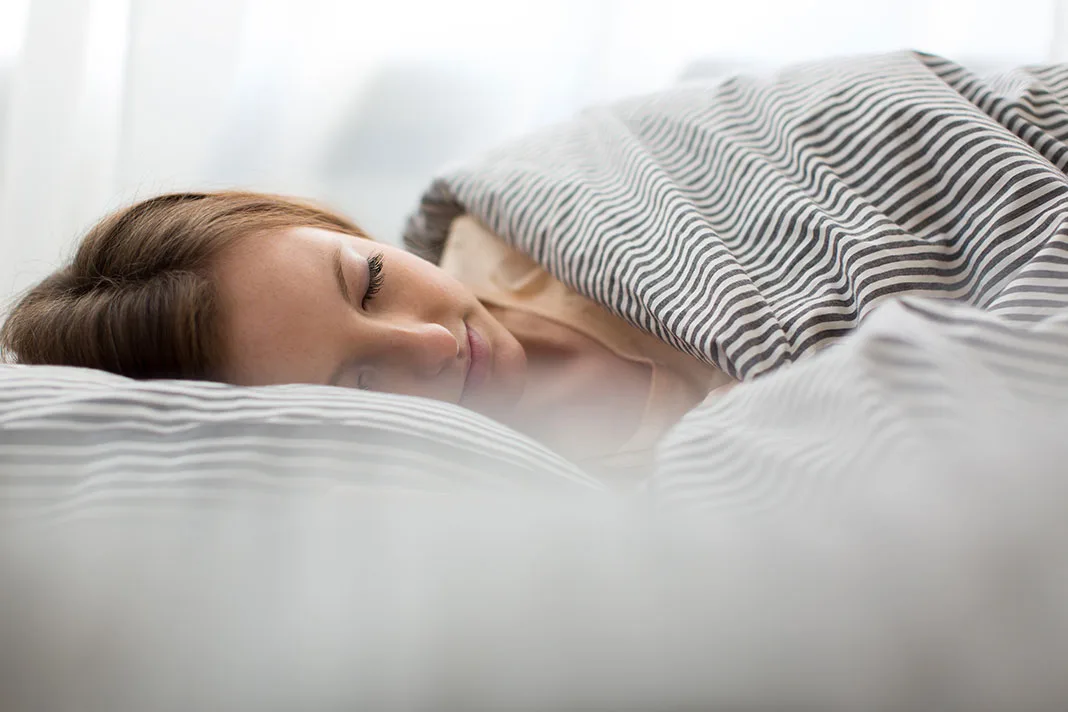A healthy lifestyle is nothing without a rock solid sleep routine. Here we share the secrets for getting your best night’s sleep
CREATE A SLEEP SANCTUARY
These easy-to-follow guidelines will create a haven for good quality sleep:Scent: Since the beginning of time, man has used natural herbs and remedies to aid sleep. Composed from nine 100% pure and natural premium grade essential oils, Saint Côme’s Aromaspray®’ Pillow Mist is designed to promote a restful, restorative sleep. Key components of this magical mist include chamomile and neroli to relieve tension and stress, lavandin, a cousin of lavender, ylang-ylang for its positive effects on emotions,geranium to balance hormones and alleviate anxiety and sweet orange, known for its properties as a natural sedative. On top of all this, it’s 100%, contains no parabens or sulphates and comes in a recyclable bottle. Spray onto the edge of your pillow, around the corners of your bedroom and down your curtains before bedtime for your best night’s sleep yet.
Silent: Our brains never stop listening even during sleep so using a pair of earplugs can ensure that any unwanted noises won’t disturb your slumber.
Dark: Making your room as dark as possible by drawing the curtains or using an eye mask informs your internal body clock that it’s time for sleep, releasing the sleepy hormone melatonin.
Cool: Setting your room temperature to a cool 16 – 17C will encourage the 1C drop in core body temperature that we need to help us fall asleep.
MAKE THE UNFAMILIAR, FAMILIAR
Known as the ‘first night effect’, recent research has shown us that the brain goes into so-called ‘surveillance mode’ when we sleep somewhere new, with some parts sleeping and others remaining alert and on the look-out for danger. Taking a few personal items with us when we are staying away from home such as bedside photos or a book can help to reduce the surveillance mode and actually help us to sleep better.
CUT THE CAFFEINE
According to doctor Matthew Walker of seminal sleep guide, Why We Sleep, caffeine has a half-life. This is the time taken for the body to eliminate one half of the caffeine in your morning cappuccino. It varies widely between people, depending on factors such as age, body weight, pregnancy status, medication intake and liver health but in healthy adults, the half-life is approximately five to six hours. This means that your post-lunch pick-me-up could be drastically disrupting your quality of sleep. It’s fine if you can’t make it through the morning without a cup of Joe, but definitely switch to decaf past 12pm.
SWITCH OFF FOR SLEEP
Checking work emails or catching up on the news before bed may seem like a good use of time, but it could be disturbing your sleep. Clinical research shows that using stimulating ‘blue-light’ emitting devices, like smart-phones or tablets, even up to two hours before our usual bedtime, keeps our brains stimulated which delays sleep onset and reduces sleep quality. Whilst most of us are unlikely to switch off two hours before bed, installing a blue-light filter on your device or creating a habit of switching off devices at least 40 minutes before bed can help.
CALM YOUR MIND
Going to bed with a busy mind can make it harder to fall off to sleep, increase night time waking and leave you feeling unrefreshed the next day. Calm your mind by choosing to gently focus your attention onto your breath for a few minutes at a time. When your mind wanders off onto thoughts, let them go by returning back to your breath. Scientific research suggests that, if practiced regularly, mindfulness can promote structural changes in the modern rational part of your brain, leading to deeper and more refreshing sleep, which is essential if you’re a frequent traveller.
NAPPING POWER
Napping is an effective natural performance enhancer, proven to help boost energy levels, memory processing and even creative problem-solving. Taking a regular nap for no more than 20 minutes – ideally between midday and 3pm – while travelling can be a helpful way of staying sharp and overcoming fatigue. Avoid napping any more than 20 minutes as you’ll run the risk of you slipping into deeper sleep and causing you to wake up feeling groggy. Napping later than 3pm will weaken your night-time sleep drive.







